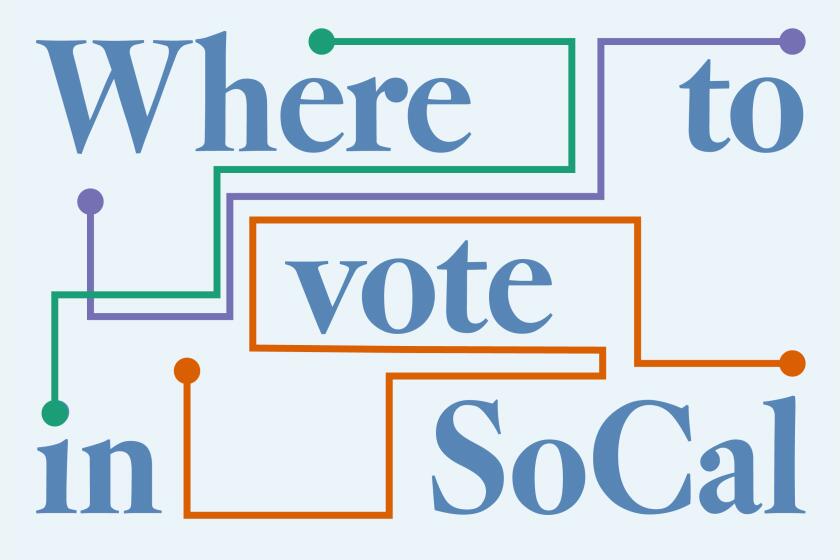L.A. schools are in COVID-19 crisis mode. What do school board candidates have to say?
- Share via
Two pivotal Los Angeles school board races are unfolding amid the COVID-19 pandemic — the most pressing issue among parents and educators and one that is exacerbating deep education inequities affecting low-income Latino and Black families.
The Times asked the four school board candidates to assess the district’s response to the emergency that has 460,000 K-12 children — 80% from low-income families — learning from home since campuses closed in March. While the candidates credit the hard work of educators and district officials, their responses also acknowledge the dissatisfaction of many parents over distance learning.
Despite the pandemic, the fundamental dynamic in the two races highlights a familiar tension: A candidate backed by charter school advocates is facing off against one backed by the teachers union, with potentially significant consequences.
However, charters versus unions oversimplifies existential questions facing the nation’s second-largest school system. Longstanding problems include serious financial strains and ongoing contention over how best to serve low-income Black and Latino students who are lagging academically and will have additional academic ground to make up when campuses ultimately reopen.
Going into the March 3 primary election, the teachers union needed victories by all three of its supported candidates to maintain a slim board majority that leans toward limiting the growth of charter schools. Most charters are nonunion and compete with district-managed schools for a diminishing number of students. And where students go, jobs and funding follow.
Union-backed Jackie Goldberg won easily in District 5, but the other two races remain up for grabs.
“There is still an expensive battle over the future of L.A.’s schools,” said UCLA professor of education Tyrone Howard. “Will charters expand and be a bigger blueprint, or will traditional schools remain a staple? This is what the struggle has been about for the better part of a decade. The question is: Do we see a viable way for either side to address deep-seated poverty that afflicts a majority of the students in the district?”
Elections
LAUSD Board of Education
Read full statements from L.A. Unified candidates on the school district’s COVID-19 response.
L.A. Board of Education District 3
One-term incumbent Scott Schmerelson, backed by unions, faces charter school administrator Marilyn Koziatek in an area that stretches across most of the west San Fernando Valley. It’s the most politically conservative board district.
A former Spanish teacher, Schmerelson, 69, was a longtime and well-liked principal until his retirement. He relishes going to schools and trying to solve hyperlocal, campus-based problems.
Despite his opposition to the hiring of L.A. school Supt. Austin Beutner — a businessman with no background running schools — Schmerelson is effusive in his praise of the district’s response to the pandemic. He cites the distribution of free meals to families, in place since March, and free computers and internet hot spots available to all students, an effort to close a digital divide affecting high-poverty areas.
“I will also say that I am not satisfied with any outcome from the district’s response that remains short of consistent engagement, reliable access to technology and the internet, and robust teaching and learning in every virtual classroom,” Schmerelson said. “After a rocky start to the new school year, attendance continues to improve and I get daily reports from many of my constituents that quality teaching and learning is happening.”
Schmerelson said it would be unfair to second-guess emergency decisions that Beutner made during a crisis, but that the time has come for the board to reclaim powers it ceded to Beutner. He also alluded to recent questions that have come up regarding Beutner’s handling of a coronavirus testing contract.
“We cannot ask our L.A. Unified families and the public to trust us with policy decisions with potential life-and-death consequences if there is even the perception of irregularities or inappropriate contracting practices,” Schmerelson said. “Accordingly, I will be asking my colleagues to review and consider modifying the almost limitless emergency delegation of power to the superintendent that the board extended in March.”
Koziatek faults the district for not being technologically up to date when the pandemic started — with both computers and adequate internet for students — asserting that the charter school where she works already had computers for every student. Internet issues have affected even her own children, she said.
“I see firsthand how the issues with poor internet impact my students’ learning,” Koziatek said. “Every time their signal drops, the students become frustrated and lose interest in participating. The district should begin a procurement process similar to Chicago Public Schools that finally eliminates the expansive internet deserts in our city. We have documented for years that our Black and brown students have inequitable access to learning.”
A college business major, Koziatek, 39, manages community outreach for Granada Hills Charter High School. Her job takes in public relations, communications with parents and work on obtaining grants. While she is pro-charter, she emphasizes that her two children attend a traditional neighborhood public school, for which she has high praise.
Koziatek also has been active in local civic organizations, frequently on matters related to education.
Schmerelson finished first in the primary, with 42% of the vote. Charter advocates are outspending unions, mostly the teachers union, by more than 6 to 1, in a race that has consumed more than $7 million.
L.A. Board of Education District 7
The winner of this contest will replace longtime incumbent and current board President Richard Vladovic, who is barred from seeing reelection by term limits. On policy matters, Vladovic moved toward or away from charters or unions at various times. Recently, the unions have been more pleased with his positions.
The district stretches from South L.A. to the Harbor area.
The two candidates have staked out similar policy positions, including in response to the pandemic. But they present different strengths. The union-backed Patricia Castellanos brings the experience of a current district parent and political savvy. Charter-backed Tanya Ortiz Franklin counters with education experience as a former classroom teacher and as an administrator within a group of schools.
Most recently, Castellanos, 50, worked as a deputy to county Supervisor Sheila Kuehl on job-creation efforts. She’s also been involved in labor-backed campaigns to improve air quality and working conditions at the port. Her experience, she said, would help in policy and funding battles.
Franklin, 36, is part of the leadership and policy-development team at the Partnership for Los Angeles Schools, a nonprofit that manages 19 of the district’s historically most low-performing campuses. Much of Franklin’s work has focused on restorative justice, which replaces student suspensions with intensive counseling.
Castellanos said LAUSD needs to do better at soliciting and acting on parent input during the COVID-19 crisis. In addition, “the district needs to expand its menu of services and support to students and to families helping students, which should include training for parents on technology and platforms students are using and increased and improved teacher training.”
“Many students still lack proper technology or internet access to engage in distance learning,” Castellanos said, a contention made by all nonincumbents. “Of course, it’s the poorest students who make up the majority of this group.”
Franklin spoke in similar terms.
“Seven months in, it’s unacceptable that some L.A. Unified students are still without devices and stable internet connectivity and many more are regularly not connecting to learning. The district should immediately coordinate and conduct home visits ... to deliver devices and hotspots and advocate nonstop with county and state agencies for permanently free and low-cost broadband for high-need families.”
Beutner has said that such efforts are under way.
Castellanos also said that the district must do more to provide childcare help for parents and that this effort should include direct assistance to students as they take part in online learning.
Franklin criticized how long it took the district to provide computers and internet hotspots to younger students. Beutner has said it was important to prioritize older students and then work downward through the grades.
Franklin also called directly for faster progress in setting up on-campus instruction for students with special needs, such as those with disabilities or those learning English. Such small-groups are permitted under current state health guidelines.
Beutner said last week that he wanted to develop and assess one-on-one voluntary tutoring, which began Oct. 5, before bringing back groups of students.
The charter-friendly side has outspent the union by about 3 to `1 in a race with combined spending of well over $6 million.
All four candidates have faced misleading negative campaigns against them that are being paid for by big-money donors. The negative campaign against Castellanos has focused on her lack of school employment experience. The negative campaigns against Franklin in District 7 and Koziatek in District 3 have underscored their backing by wealthy charter-school supporters, whom the union labels as corporate profiteers and privatizers.
A campaign funded by charter advocates has accused Schmerelson of “pocketing” a pay raise that tripled his salary. These mailers failed to note that other board members, including those supported by charters, received the same salary, about $125,000 per year, and that an independent commission sets the pay rates. The campaign also misleadingly linked Schmerelson to child-molestation scandals that predated his term in office.
All the candidates disassociate themselves from the independent negative campaigns on their behalf.
More to Read
Sign up for Essential California
The most important California stories and recommendations in your inbox every morning.
You may occasionally receive promotional content from the Los Angeles Times.















